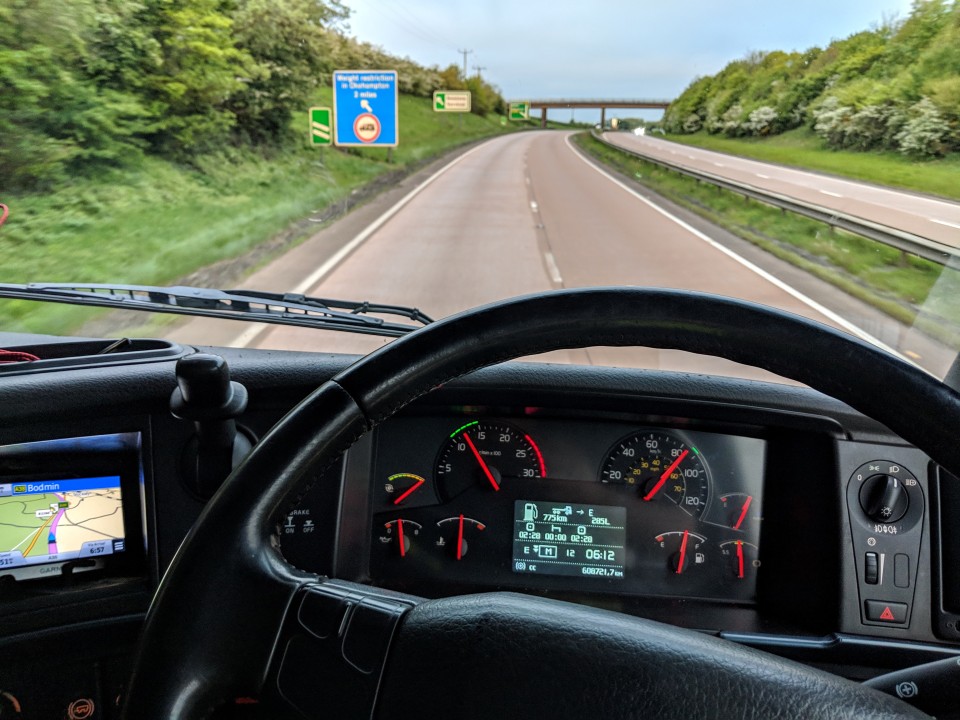
Susie Jones
Cum să fii un șofer de camion sănătos
Creat: 27.08.2024
•
Actualizat: 27.08.2024
Fiind o profesie solicitantă, condusul de camioane implică în mod frecvent ore lungi, un stil de viață sedentar și perioade lungi departe de casă, ceea ce poate afecta adesea sănătatea multor șoferi.
Obiceiurile nesănătoase, cum ar fi consumul de fast-food, lipsa de activitate fizică și tiparele de somn perturbatoare pot duce la potențiale complicații de sănătate în viitor. Dar cum vă mențineți în formă ca șofer de camion? Este mai ușor de spus decât de făcut, dar am compilat o listă de sfaturi care să vă ajute să vă mențineți în formă maximă pe drum.
Șase sfaturi de top pentru a rămâne sănătos pe drum
1.Hidratarea
Un sfat simplu și un bun pe care adesea îl luăm de bun, totuși, majoritatea problemelor de sănătate apar din cauza deshidratării. Înghițiturile regulate de apă sau de suc de-a lungul zilei vor expulza deșeurile metabolice și toxinele din sistem și vă vor menține mai energici și mai atenți. Păstrarea cu dvs. a unei sticle de apă reîncărcabile nu numai că vă va reaminti să vă hidratați, dar este și mai bună pentru mediu.
2.Dieta
Tentația fast-food-ului după o zi lungă este ceva la care ne putem raporta cu toții, totuși, la fel ca și menținerea hidratării, dieta ta joacă un rol semnificativ în sănătatea ta, precum și în modul în care vei ajunge să te simți pe parcursul zilei.
Se recomandă ca șoferii de camion să mănânce de trei până la patru ori pe zi, fie două mese și două gustări, fie două mese și o gustare. Încercați să mențineți un plan de mese și gustări bogat în omega-3, fier și vitamina C, cum ar fi legumele cu frunze verzi, peștele și fructele. Evitați consumul frecvent de alimente și băuturi precum pastele, pâinea, băuturile dulci și stimulentele precum cafeaua și băuturile energizante.
Consultați lista noastră de gustări sănătoase pe care să le păstrați în cabina dvs:
Batoane Granola
Batoane energizante
Popcorn
Nuci
Fructe uscate
Ciocolată neagră
Pe lângă achiziționarea de alimente sănătoase în timp ce sunteți pe drum, poate fi uneori mai sănătos și mai rentabil să pregătiți masa. Frieghtech are o selecție fantastică de rețete pentru a vă ajuta să mențineți o dietă sănătoasă în timpul serviciului.
3.Sleep
Din cauza naturii meseriei, somnul suficient poate fi dificil pentru un șofer de camion și poate duce la rezultate devastatoare pentru toată lumea de pe șosea.
Sfaturi și trucuri simple, cum ar fi cele de mai jos, vă pot ajuta să dormiți o noapte decentă:
Creați un mediu în cabină care să vă facă să vă simțiți ca acasă. Consultați postarea noastră despre cum să faceți din cabina camionului dvs. o casă
Păstrați zona de dormit întunecată
Un duș fierbinte: Folosiți pagina noastră maps pentru a afla ce stații de camioane oferă această facilitate
Încercați câteva aplicații pentru a vă ajuta să dormiți
Găsiți locul ideal pentru a parca fără zgomot și fără perturbări. Aplicația noastră intruck vă pune la dispoziție 5.000 de locații HGV (Heavy Goods Vehicle) din întreaga Europă, din care puteți alege, în timp ce echipa noastră [SNAP Access and Security] (https://snapaccessandsecurity.com/) vă poate oferi soluții de securitate personalizate, permițându-vă să dormiți mai bine noaptea, știind că dumneavoastră și camionul dumneavoastră sunteți în siguranță.
4.Exercițiu
Unul dintre cele mai dificile sfaturi de urmat în timp ce sunteți pe drum, dar unul important, totuși. Orele lungi de ședere pe parcursul zilei pot duce la o postură proastă, dureri de spate și potențiale complicații de sănătate. După o zi lungă la volan, poate fi tentant să stai și să te relaxezi, totuși, o activitate rapidă de 15 minute, cum ar fi mersul pe jos sau întinderea, te poate face să te simți întinerit și mai puțin stresat.
HMD Trucking are câteva exerciții utile adaptate pentru șoferii de camioane dacă doriți să încorporați mai multe tipuri de exerciții fizice în rutina dumneavoastră.
5.Vitamine
Fiind pe drum cu normă întreagă, poate fi dificil să obțineți toate vitaminele necesare. Luarea unei multivitamine în fiecare zi vă poate stimula sistemul imunitar și vă poate ajuta să rămâneți sănătos.
6.Sănătatea mintală
Știm că este important să ai grijă de sănătatea ta fizică pe șosea, dar cât timp alocă șoferii de camion pentru a avea grijă de sănătatea lor mentală?

Organizația caritabilă pentru sănătate mintală Mind a publicat statistici care relevă faptul că 30% din bolile profesionale autodeclarate în industria transporturilor și logisticii sunt cauzate de anxietate, singurătate, stres și depresie. Aceștia au sugerat, de asemenea, că acest număr ar putea fi mai mare, deoarece majoritatea oamenilor nu caută ajutorul de care au nevoie. În plus, 95% dintre persoanele bolnave nu vor da motivul real al absenței lor de la locul de muncă dacă acesta este legat de sănătatea lor mintală.
Urmarea sfaturilor și trucurilor de mai sus poate avea un efect pozitiv asupra sănătății dvs. mintale. În plus, este important să aveți conversații deschise și sincere cu alți șoferi de camion, supervizori sau dispeceri.
Exercițiile fizice vă pot face un șofer mai bun?
Nu numai că un stil de viață sănătos duce la o mai bună sănătate mintală, dar există dovezi care sugerează că acesta vă poate face și un șofer mai bun. Un studiu a arătat că șoferii cărora li s-a cerut să facă mișcare zilnic au raportat o mai mare ușurință în a-și întoarce capul, au fost capabili să își rotească mai mult corpul și au putut să urce mai repede în mașină.
Care este cea mai grea parte a meseriei de șofer de camion?
Orele lungi par a fi unul dintre cele mai dificile aspecte ale conducerii unui camion. Drumarii se confruntă adesea cu kilometri lungi de parcurs și cu ore antisociale. Acești kilometri lungi și orele antisociale pot duce la un stil de viață nesănătos.

Cât de nesănătos este să fii șofer de camion?
Datorită stilului de viață al multor șoferi de camion, în medie, aceștia sunt statistic mai predispuși să aibă probleme de sănătate comparativ cu persoanele din alte cariere. Camionagii se confruntă adesea cu câteva obstacole, cum ar fi spațiile de lucru înghesuite, situațiile stresante, tiparele de somn neobișnuite și lipsa alimentelor nutritive, care toate au o influență asupra sănătății lor.
Menținerea unui stil de viață sănătos în calitate de șofer de camion necesită un efort conștient, dar beneficiile acestui lucru merită din plin. Sfaturile de mai sus vă vor permite să preluați controlul asupra sănătății dumneavoastră și să vă îmbunătățiți bunăstarea. Fiți cu ochii în patru pentru mai multe sfaturi și trucuri de la noi, cei de la SNAP.



